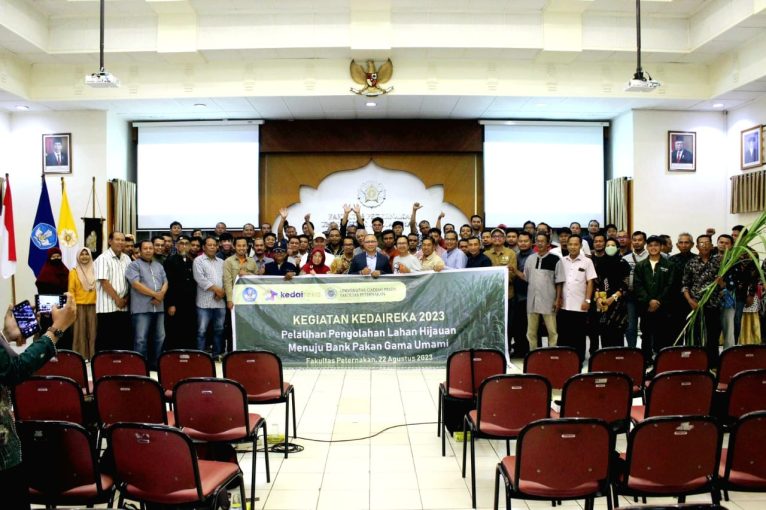
Faculty of Animal Science Universitas Gadjah Mada held a training event for farmers and livestock breeders titled “Training on Forage Land Management Towards Gama Umami Feed Bank” on August 22. This event is part of the activities funded by the Kedaireka Matching Fund grant from the Ministry of Education, Culture, Research, and Technology – Directorate General of Higher Education of the Republic of Indonesia (Kemendikbudristek – Dikti RI).
The event was held at Faculty of Animal Science Auditorium and attended by 100 livestock breeders and farmers from the Sleman Regency (dairy farmers who were involved in the Kedaireka activities of Faculty of Animal Science), as well as additional participants from Bantul, Kulonprogo, Gunung Kidul, and other regions such as Depok, Pacitan, Pati, and Kendal. This training is part of an effort to ensure feed security available throughout the season through land management and cultivation. The event opened with a speech by Prof. Ir. Budi Guntoro, S.Pt., M.Sc., Ph.D., IPU., ASEAN Eng., Dean of the Faculty of Animal Science at Universitas Gadjah Mada. In his speech, he emphasized the Faculty’s commitment to contributing and assisting the community in the field of animal science, particularly feed. The symbolic handover of Gama Umami seedlings was carried out by the Dean to the representative breeders in attendance.
There were two activities in this training. First, a presentation and socialization on good forage feed for livestock by Prof. Ir. Nafiatul Umami, S.Pt., M.P., Ph.D., IPM., ASEAN Eng. The next topic was the utilization of biomass as a land amendment source for grass planting and the use of household waste as fertilizer by Nasih Widya Yuwono, S.P., M.P. from the Faculty of Agriculture. The second activity involved a hands-on practice in making stacked compost bins.
Prof. Ir. Nafiatul Umami, S.Pt., M.P., Ph.D., IPM., ASEAN Eng., as the inventor, provided knowledge about the potential of Gama Umami grass and forage feed management from land processing to maintenance. This training also introduced Gama Umami grass, a result of breeding and research by Prof. Nafiatul Umami, highlighting its cultivation techniques in various marginal land conditions. The advantages of Gama Umami include its biomass production, which can reach 50 kg/m2, finer morphology compared to other elephant grasses, and high content of reducing sugars, making Gama Umami an excellent energy source for ruminant livestock. In his presentation, Mr. Nasih Widya Yuwana explained the importance of using KALAM (compost, charcoal, leachate, ash, and microbes) as components of land amendments and as a growing medium for Gama Umami grass to optimize its genetic potential.
The next activity involved the practical creation of stacked compost bins led by Nasih Widya Yuwono, S.P., M.P., who explained that these bins could be filled with various household wastes and used as fertilizer. The training concluded with a discussion and distribution of Gama Umami cuttings to the training participants. (Secretariat/Prisil)
